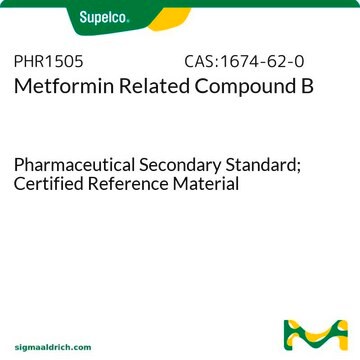1396309
USP
Metformin hydrochloride
United States Pharmacopeia (USP) Reference Standard
Synonym(s):
1,1-Dimethylbiguanide hydrochloride, Metformin
About This Item
Recommended Products
grade
pharmaceutical primary standard
API family
metformin
manufacturer/tradename
USP
mp
223-226 °C (lit.)
application(s)
pharmaceutical (small molecule)
format
neat
SMILES string
Cl[H].CN(C)C(=N)NC(N)=N
InChI
1S/C4H11N5.ClH/c1-9(2)4(7)8-3(5)6;/h1-2H3,(H5,5,6,7,8);1H
InChI key
OETHQSJEHLVLGH-UHFFFAOYSA-N
Gene Information
Looking for similar products? Visit Product Comparison Guide
General description
Application
Also used to prepare standard, mixed standard stock and system suitability solutions for the assay, impurity analysis and performance tests according to the given below monographs of United States Pharmacopeia (USP):
- Metformin Hydrochloride
- Pioglitazone and Metformin Hydrochloride Tablets
- Metformin Hydrochloride Tablets
- Glyburide and Metformin Hydrochloride Tablets
Biochem/physiol Actions
Analysis Note
Other Notes
related product
Signal Word
Warning
Hazard Statements
Precautionary Statements
Hazard Classifications
Acute Tox. 4 Oral - Eye Irrit. 2
Storage Class Code
11 - Combustible Solids
WGK
WGK 1
Flash Point(F)
Not applicable
Flash Point(C)
Not applicable
Certificates of Analysis (COA)
Search for Certificates of Analysis (COA) by entering the products Lot/Batch Number. Lot and Batch Numbers can be found on a product’s label following the words ‘Lot’ or ‘Batch’.
Already Own This Product?
Find documentation for the products that you have recently purchased in the Document Library.
Customers Also Viewed
Our team of scientists has experience in all areas of research including Life Science, Material Science, Chemical Synthesis, Chromatography, Analytical and many others.
Contact Technical Service








